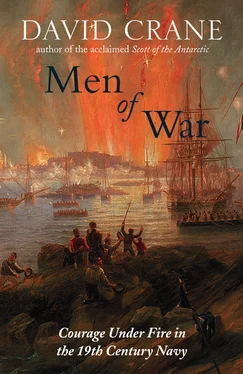1 ...7 8 9 11 12 13 ...33 Assumed old Neptune’s name:
One from Gallia, one from Spain,
And one from England came.
The British Neptune as of yore,
Proved master of the day;
The Spanish Neptune is no more,
The French one ran away.
In the immediate aftermath of the battle, though, as carpenters and surgeons went to work with their knives and saws, corpses were flung overboard, and the news of Nelson’s death spread through the fleet, there was little temptation to triumphalism. During his last moments Nelson had repeatedly enjoined Hardy to drop anchor at the end of the day, and yet for some inexplicable reason Collingwood decided against it, condemning his scattered and dismasted fleet itself to every sailor’s nightmare of a heavy swell, a freshening wind and a perilous lee shore.
It would have been harder to say which stuck most vividly in men’s memories of Trafalgar, the battle itself or its terrible aftermath, as the stricken members of the fleet fought for their lives and prizes against a gale that was of a piece with everything that had gone before. In spite of her damage the Neptune was actually in a better state than most to ride it out, and after taking the Royal Sovereign in tow the following day, she was deployed again on the twenty-third to counter a bold enemy attempt to recapture what it could of its lost ships.
With the weather worsening again after a brief respite – the barometer reading that night at the Royal Observatory just south of Cádiz was the lowest ever recorded – and the shattered Combined Fleet in no state to renew a general action, anxieties in Neptune rapidly turned to their hard-won prize. From the moment they had gone into action the towering Santissima Trinidada – the largest battleship in the world – had been marked as theirs , and their first sight of her after the battle, when a prize crew under William Badcock went aboard to take possession, provided a bloody testament to the appalling destruction Neptune ’s ‘beautiful firing’ had inflicted. ‘She had between 3 and 400 killed and wounded,’ Badcock told his father, ‘her Beams where coverd with Blood, Brains, and peices of Flesh, and the after part of her Decks with wounded, some without Legs and some without an Arm, what calamities War brings on.’
As conditions grew more desperate than ever, and self-interest gave way to self-preservation, Collingwood gave the order to ‘sink, burn and destroy’ all prizes, and Badcock’s thwarted crew went to work in the dark and mountainous seas. ‘We had to tie the poor mangled wretches around their waists, or where we could,’ another of Neptune ’s officers recalled, as lower gun ports were opened, holes cut in the hull, and the last of the wounded winched off, ‘and lower them into a tumbling boat, some without arms, others no legs, and lacerated all over in the most dreadful manner.’
There were 407 taken off in the Neptune ’s boats alone – a last boat went back for the ship’s cat, spotted perched on the muzzle of a gun as the Trinidada rolled helplessly in her death throes – and shortly after midnight the pride of the Spanish fleet and Neptune ’s prize-money went to the bottom. ‘I am afraid this brilliant Action will not put much money in my pocket,’ wrote Fremantle – unusually benign for him, given that he had nothing more tangible to show for Trafalgar than the Trinidada ’s pug dog (the cat had gone to Ajax ),
but I think much may arise out of it ultimately. This last Week has been a scene of Anxiety and fatigue beyond any I ever experienced … I am at present towing the Victory and the Admiral has just made the signal for me to go with her to Gibraltar … We have ten men killed and 37 Wounded, which is very trifling when compared to some of the other Ships, however we alone have certainly the whole credit of taking the Santissima Trinidada , who struck to us alone . Adml. Villeneuve was with me over two days, I found him a very pleasant and Gentlemanlike man, the poor man was very low! … This fatigue and employment has entirely driven away the bile and if poor Nelson had not been among the slain I should be most completely satisfied.
His letter is dated ‘off Cadiz the 28th Oct. 1805’. He was right to be satisfied. By any other measure than a butcher’s bill the Neptune had acquitted herself heroically. ‘7 November,’ reads the ship’s log ten days later, as they made passage for Gibraltar: ‘Captain Fremantle read a letter of thanks from Vice Admiral Collingwood to all officers & men belonging to the Fleet for their conduct on the 21st Octo. Performed Divine Service & returned thanks to the Almighty God for the victory gained on the day.’ Frank Hastings would have done well to have forgotten his father’s atheism and joined in. At the age of just eleven he had survived the storm of the century and the greatest battle ever fought under sail. The next time – twenty-two years later at Navarino – there would be an action of similar proportions, his brilliance and daring would have gone a long way towards provoking it.
III
One of the great disappointments of Hastings’s story is that there is neither a portrait of the unusually small, fair-haired lad who had fought at Trafalgar, nor any surviving account from him of his part in the battle. It is clear from the Fremantle correspondence that Frank wrote an indignant protest at being sent below, but it would seem likely that his disappointed father destroyed that along with all his other letters in the aftermath of the Kangaroo incident, reducing his boy at one embittered stroke to a silent and anonymous role in all the great dramas of his early life.
There is an unusually rich and varied archive to fill the gaps – captains’ letters, testimonials, Admiralty minutes, ships’ logs, tailors’ bills – but nothing quite makes up for the absence of Frank’s own voice. It is easy enough to follow the external outline of his career over the next six years, but the formative steps that operated on his genetic inheritance to transform him from the small frightened boy on the quarterdeck of Neptune into the commander of the Kangaroo remain frustratingly, elusively, out of reach.
By the time one hears his own voice, the movement and rhythms of a man-of-war, the mouldering damp and discomfort, the proximity of death and violence, the chronic sleeplessness and brutal intimacy that were the universal experience of any young officer were so much a part of his nature that they pass unnoticed. In the youthful letters of a Peel or Goodenough there is a vivid sense of what it was like to be a boy at sea, but when Hastings finally emerges from his midshipman’s chrysalis it is as the finished product, as inured to the hardships and dangers of naval life as he is to the sense of wonder and curiosity that clearly once touched him.
There are times, in fact – so complete is the absence of ‘colour’, so absolute the sense of purpose and concentration in his adult letters – when it feels as though one is following a man through a sensory desert. Over the last ten years of the Napoleonic Wars he served and fought from the China Seas to the Gulf of Mexico, yet one would no more know from Hastings what it felt like to be shipwrecked in the icy black waters off Halifax than how shattering it was to drag a massive naval gun through the swamps and bayous of New Orleans.
The magical island fortresses of the Ligurian Sea, the baroque grandeur of Valetta, the feckless elegance of Nauplia’s Palamidi fortress, the harsh and brilliant clarity of the Cyclades, the romance of the Dardanelles, the numinous charge that attaches itself to the landscape of Greece – these were the background to his fighting life, but one would need one’s longitudes and latitudes to know it. It was not that Hastings was blind to either people or place – he was a naval officer trained to see and record – but where other men looked at modern Nafpaktos and saw historic Lepanto, Hastings looked at Lepanto and saw Nafpaktos; where other men saw the harbour from which the Argo sailed or the little ribbon of island on which Spartan soldiers first surrendered, Hastings saw only currents, breezes, lines of fire and anchorages.
Читать дальше











